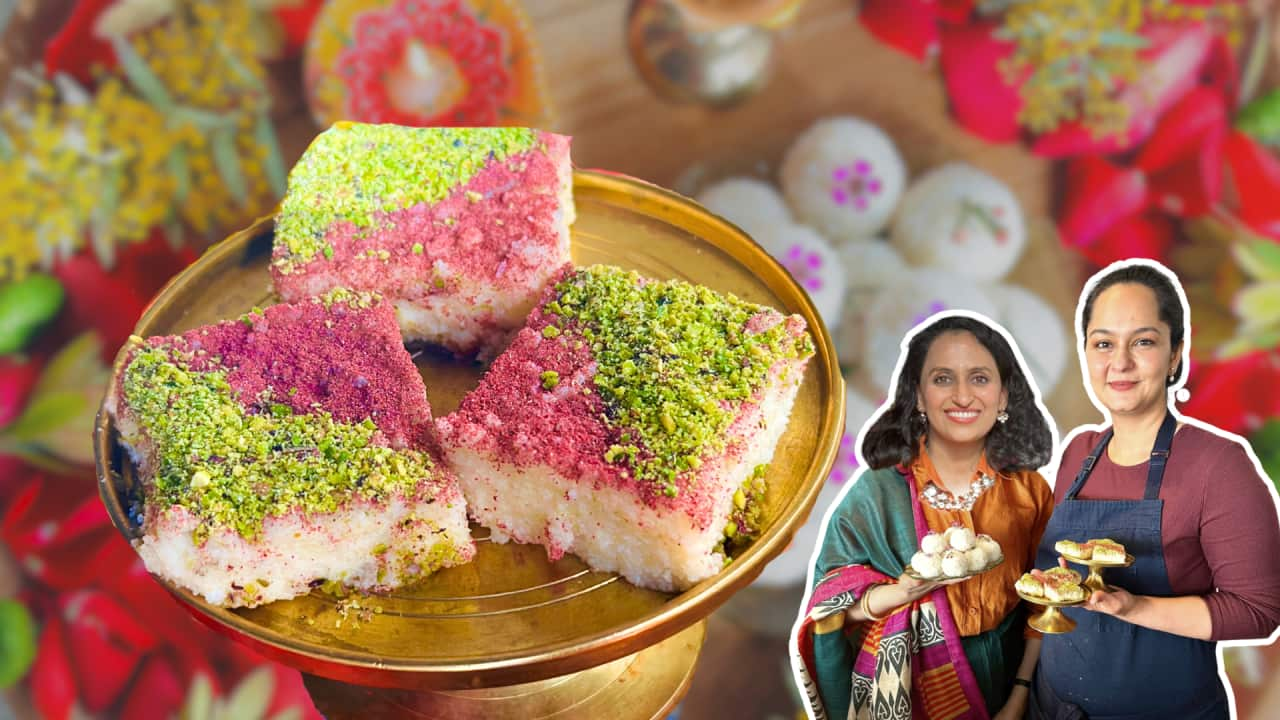makes
10-12
prep
15 minutes
cook
30 minutes
difficulty
Easy
makes
10-12
serves
preparation
15
minutes
cooking
30
minutes
difficulty
Easy
level
Ingredients
- 1 litre full cream milk for 'chena' + 1 litre for cooking
- 150 ml thickened cream
- 2 tbsp lemon juice/vinegar/yogurt
- ¼ cup sugar (adjust to taste)
- ½ tsp lemon myrtle powder
- 1 tsp ghee
For garnish
- 1 tbsp crushed pistachios
- A pinch of lemon myrtle powder
- ½ tsp Davidson plum powder
- ½ tsp rose powder
Instructions
- Prepare the chena: Heat 1 litre full cream milk in a heavy-bottomed pan until it just begins to boil.
- Lower the heat and add lemon juice gradually, stirring gently until the milk curdles and the whey separates.
- Strain through a muslin cloth and rinse the chena under cold water to remove the lemon flavour.
- Gently squeeze out excess water and crumble it with your hands. The chena should remain slightly moist and crumbly
- Cook the kalakand mixture: Heat the remaining 1 litre milk and the thickened cream in a pan and bring it to boil
- Then add the chena into the boiling milk.
- Cook over low heat for about 5–6 minutes, stirring constantly.
- Add sugar and continue to stir as the mixture first loosens and then thickens again.
- When it starts leaving the sides of the pan but is still a little moist, stir in the lemon myrtle powder and cook for another 1–2 minutes.
- Set the kalakand: Grease a tray or plate with ghee and pour in the mixture.
- Flatten gently to about 1.5–2 cm thickness.
- Allow it to rest on room temperature or in a fridge to cool down completely.
- Once cool enough to hold shape, cut the mixture in the tray into squares.
- In a sift, mix the Davidson plum and rose powders to make it one nice mix.
- Garnish one half of each square with crushed pistachios and the other with Davidson plum and rose powder mix for a pop of colour. Sprinkle a pinch of lemon myrtle on the squares.
- Refrigerate for 1–2 hours to set completely. Serve chilled or at room temperature.
Cook's Notes
Oven temperatures are for conventional; if using fan-forced (convection), reduce the temperature by 20˚C. | We use Australian tablespoons and cups: 1 teaspoon equals 5 ml; 1 tablespoon equals 20 ml; 1 cup equals 250 ml. | All herbs are fresh (unless specified) and cups are lightly packed. | All vegetables are medium size and peeled, unless specified. | All eggs are 55-60 g, unless specified.
